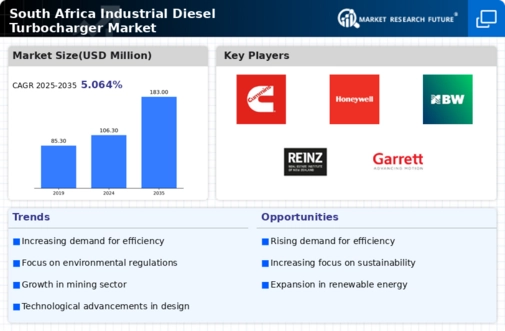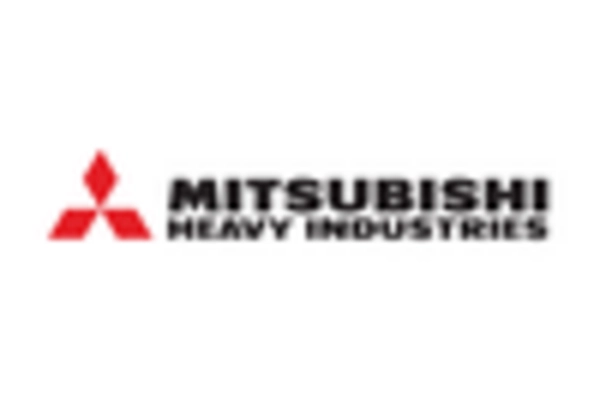Rising Demand for Energy Efficiency
The industrial diesel-turbocharger market is experiencing a notable increase in demand for energy-efficient solutions. As industries in South Africa strive to reduce operational costs and enhance productivity, the focus on energy efficiency becomes paramount. The implementation of advanced turbocharging technologies can lead to fuel savings of up to 15%, which is particularly appealing in a market where fuel prices are volatile. This trend is further supported by government initiatives aimed at promoting energy conservation, thereby driving the adoption of innovative turbocharger systems. Consequently, manufacturers are compelled to invest in research and development to meet these evolving demands, positioning themselves favorably within the industrial diesel-turbocharger market.
Investment in Infrastructure Development
The industrial diesel-turbocharger market is benefiting from substantial investments in infrastructure development across South Africa. Government initiatives aimed at improving transportation networks, energy generation, and public facilities are creating a favorable environment for the adoption of diesel engines equipped with turbochargers. The infrastructure sector is projected to grow at a CAGR of 5% over the next few years, which is likely to bolster the demand for efficient diesel engines. As construction projects ramp up, the need for reliable and powerful machinery becomes critical, thereby driving the industrial diesel-turbocharger market. This trend indicates a sustained growth potential as infrastructure projects continue to unfold.
Growth in Mining and Construction Sectors
The industrial diesel-turbocharger market is significantly influenced by the growth of the mining and construction sectors in South Africa. These industries are characterized by their heavy reliance on diesel engines, which are often equipped with turbochargers to enhance performance and efficiency. The mining sector alone contributes approximately 8% to the national GDP, creating a robust demand for high-performance diesel engines. As these sectors expand, the need for reliable and efficient turbocharging solutions becomes increasingly critical. This growth trajectory suggests a promising outlook for the industrial diesel-turbocharger market, as companies seek to optimize their machinery for better output and lower emissions.
Technological Innovations in Turbocharging
The industrial diesel-turbocharger market is witnessing a wave of technological innovations that are enhancing the performance and efficiency of diesel engines. Advancements such as variable geometry turbochargers and electric turbochargers are gaining traction, offering improved response times and better fuel efficiency. These innovations are particularly relevant in South Africa, where industries are increasingly seeking ways to optimize engine performance while minimizing environmental impact. The integration of smart technologies into turbocharging systems is also on the rise, allowing for real-time monitoring and adjustments. This trend suggests that the industrial diesel-turbocharger market is poised for significant transformation, driven by the need for cutting-edge solutions that meet the demands of modern industries.
Regulatory Compliance and Emission Standards
The industrial diesel-turbocharger market is being shaped by stringent regulatory compliance and emission standards imposed by the South African government. As environmental concerns gain prominence, regulations are evolving to limit emissions from diesel engines. This has led to a surge in demand for turbochargers that can help meet these standards by improving combustion efficiency and reducing harmful emissions. The market is witnessing a shift towards advanced turbocharging technologies that not only comply with regulations but also enhance engine performance. This regulatory landscape is likely to drive innovation within the industrial diesel-turbocharger market, as manufacturers strive to develop solutions that align with both performance and environmental requirements.
















